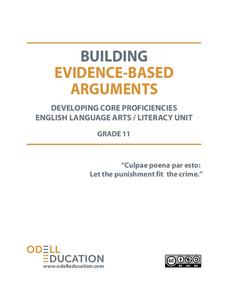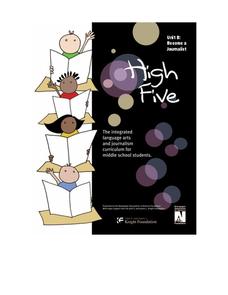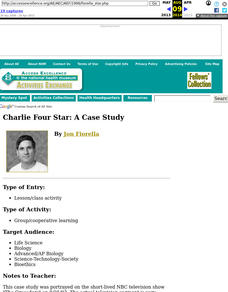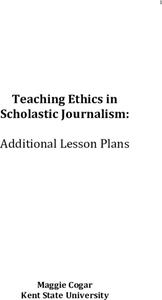University of Minnesota
Ethics of Dissection
There's an elephant in your classroom. That's right — a big, awkward elephant named Dissection. Sure, you'd like to talk about him ... but how? Whether you're a seasoned teacher or fresh out of student teaching, the topic of dissection...
Beyond Benign
Medical Ethics
Just because we have the ability to determine an organism's traits through genetic testing, should we do it? Middle-school medical experts examine the ethical dilemmas in biotechnology in the 18th and final installment in a series of...
Collaborative for Academic, Social, and Emotional Learning (CASEL)
Examples of Social and Emotional Learning in Elementary Mathematics Instruction
A 12-page document lists an abundance of math-related activities that boost social and emotional topics; self-awareness, self-management, social awareness, relationship skills, and responsible decision making.
PBS
Frankenstein: The Consequence of Creation
Famous as a horror story, as the first science fiction novel, Frankenstein is also a tale of ambition, a warning about unbridled science, and responsibility for actions. Readers consider what the tale says of the consequences of creation...
Odell Education
Building Evidence-Based Arguments: "Cuplae poena par esto: Let the punishment fit the crime."
Should a criminal's punishment match the crime? An argumentative writing plan explores this question as class members investigate a variety of mixed-medium sources by experts in the field, form evidence-based claims, and support them...
Media Education Lab
The Ethics of Propaganda
What are the short and long-term consequences for consumers and producers of modern media propaganda? Class members ponder this essential question as their unit study of ethics of propaganda concludes. After examining two case...
Online Publications
Become a Journalist
Explore the newspaper as a unique entity with a detailed and extended unit. The unit requires learners to consider the newspaper's role in democracy, think about ethics, practice writing and interviewing, and examine advertising and news...
Curated OER
Selfless Service and The Giving Tree - Building Ethical Conscience
Upper elementary schoolers investigate philanthropy and selflessness by reading a children's book. In this ethics lesson, they read The Giving Tree by Shel Silverstein, and research Mahatma Gandhi's troublesome, yet inspiring, life....
Curated OER
What's Wong? What's Right?
Explore the ethics, responsibilities, and impacts of the career cluster that relates to law. Learners examine various cases where legal action was taken and resulted in a consequence. They'll act out various scenarios, research jobs in...
Curated OER
Charlie Four Star: A Case Study
Engage in a class debate dealing with the allocation of organs to those waiting for a transplant. How do they decide who gets a transplant and who doesn't? Learners attempt to determine what is fair for the individual requiring an organ...
Curated OER
Walter Reed's Yellow Fever Studies
Middle schoolers and high schoolers examine the ethics of using human test subjects in scientific research. They do a simulation which focuses on yellow fever and how human subjects were used to develop a treatment/cure for the disease...
University of Minnesota
Whose Choice Is It Anyway?
Your taste buds may be saying Pepsi, but your brain is saying Coke! By analyzing experimental research, learners discover ways in which our brains impact decision making. They conclude with a discussion of neuromarketing and how it...
K20 LEARN
No Imitations, Please! Avoiding Plagiarism
With all the stuff available online, good essays are just a click away. But talk about tracking! Writers beware! New tech can now identify plagiarism, and the consequences of presenting someone else's work as your own are severe. Here's...
Common Sense Media
My Online Code
Approach ethical online behavior with a series of activities geared toward teaching pupils about digital citizenship. After a brief discussion about ethics, small groups inspect a fictional social networking profile with ethics in mind....
Nebraska Department of Education
This I Believe
As part of a Career Develop unit, eighth-graders reflect on their beliefs and values and consider how these beliefs might affect their relationships with friends and with colleagues when they join the workforce.
Nebraska Department of Education
The Five Things
High school freshmen consider how their resources and values can support them in their future goals by answering questions such as; What do you value? What do you enjoy doing? What do you do well? Of what accomplishments are...
Orange County Department of Education
My Character Odyssey
Young scholars explore and analyze how the trials of life can develop one's character and values of respect, responsibility and compassion. Then, while reading and evaluating The Odyssey, they reflect on their own hero journey and write...
Beyond Benign
Is It Easy Being Green Game Show
Is it possible to create an environmentally friendly shampoo? Learners accept this challenge in the fifth lesson plan in a green chemistry series of 24. The analysis of their shampoo ingredients must address pH, exothermic reactions, and...
National Endowment for the Humanities
Man and Superman
Ordinary and extraordinary readers will find much to contemplate in a activity on Crime and Punishment as they examine the dichotomies in Dostoevsky's novel. Scholars reflect on Raskolnikov's theory that extraordinary individuals are not...
National Endowment for the Humanities
Themes in Lord of the Flies
William Golding's Lord of the Flies is the anchor text for a lesson that teaches readers how to distinguish between a literary topic and a literary theme. Using the provided worksheets, groups first chart some themes and propose a...
Newseum
Journalists Code of Ethics
Journalists are supposed to adhere to a Code of Ethics. To determine the degree to which reporters follow this code, individuals select three recent stories with photographs from newspapers, magazines, online news sites, or television...
Newseum
Media Ethics: Fairness Formula Starts With Accuracy
As part of a study of media ethics, young journalists apply a fairness formula to news reports. They look at accuracy, balance, completeness, detachment, and ethics to determine if the reporting is fair.
Workforce Solutions
Workplace Ethics
An activity that focuses on workplace ethical dilemmas asks groups how to respond to a series of scenarios. First, the class brainstorms a list of ethics that apply to employers, then a second one that applies to employees. Using their...
Kent State University
Teaching Ethics in Scholastic Journalism
Events in recent years have underscored the importance of a free and independent press in a democracy. Young journalists engage in lessons about the function of journalism in a democratic society, practice the steps of Bok's Ethical...

























